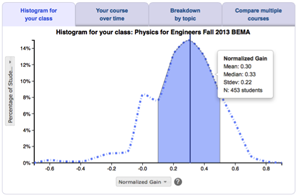
Energy Project
Developed by: Hunter Close, Eleanor Close, Lezlie DeWater, Stamatis Vokos, Lane Seeley, Rachel Scherr, and Sam McKagan
Level










middle schoolhigh schoolintro collegeinter-mediateupper levelgrad school other

conceptual



middle schoolhigh schoolintro collegeinter-mediateupper levelgrad school other

conceptual
Topics




Setting


Overview
What? A professional development program for K-12 teachers on the learning of energy. Teachers learn about energy, and learn to experience science as an area where they and their students are empowered to figure things out. They construct their own understanding about energy and about learning.
Student skills developed
Designed for:
- Conceptual understanding
- Making real-world connections
- Using multiple representations
- Metacognition
Instructor effort required
- High
Resources required
- Tables for group work
Resources
Developer's website: Energy Project
Intro Article: H. Close, L. DeWater, E. Close, R. Scherr, and S. McKagan, Using the Algebra Project Method to Regiment Discourse in an Energy Course for Teachers, presented at the Physics Education Research Conference 2010, Portland, Oregon, 2010.
Research
RESEARCH VALIDATION
This is the third highest level of research validation, corresponding to:
- at least 1 of the "based on" categories
- at least 1 of the "demonstrated to improve" categories
- at least 1 of the "studied using" categories
Research Validation Summary
Based on Research Into:
- theories of how students learn
- student ideas about specific topics
Demonstrated to Improve:
- conceptual understanding
- problem-solving skills
- lab skills
- beliefs and attitudes
- attendance
- retention of students
- success of underrepresented groups
- performance in subsequent classes
Studied using:
- cycle of research and redevelopment
- student interviews
- classroom observations
- analysis of written work
- research at multiple institutions
- research by multiple groups
- peer-reviewed publication
References
- C. Alvarado, A. Daane, R. Scherr, and G. Zavala, Responsiveness Among Peers Leads to Productive Disciplinary Engagement, presented at the Physics Education Research Conference 2013, Portland, OR, 2013.
- L. Atkins Elliott, C. Erstad, P. Gudeman, J. McGowan, K. Mulhern, K. Prader, G. Rodriguez, A. Showaker, and A. Timmons, Animating Energy: Stop-Motion Animation and Energy Tracking Representations, Phys. Teach. 52 (3), 152 (2014).
- E. Close, R. Scherr, H. Close, and S. McKagan, Development Of Proximal Formative Assessment Skills In Video-based Teacher Professional Development, presented at the Physics Education Research Conference 2011, Omaha, Nebraska, 2011.
- H. Close, L. DeWater, E. Close, R. Scherr, and S. McKagan, Using the Algebra Project Method to Regiment Discourse in an Energy Course for Teachers, presented at the Physics Education Research Conference 2010, Portland, Oregon, 2010.
- A. Daane, S. Vokos, and R. Scherr, Learner Understanding of Energy Degradation, presented at the Physics Education Research Conference 2013, Portland, OR, 2013.
- A. Daane, S. Vokos, and R. Scherr, Conserving energy in physics and society: Creating an integrated model of energy and the second law of thermodynamics, presented at the Physics Education Research Conference 2012, Philadelphia, PA, 2012.
- A. Daane, L. Wells, and R. Scherr, Energy Theater, Phys. Teach. 52 (5), 291 (2014).
- K. Gray and R. Scherr, Drawing energy: Evidence of Next Generation Science Standards for energy in diagrams, presented at the Physics Education Research Conference 2016, Sacramento, CA, 2016.
- B. Harrer, R. Scherr, M. Wittmann, H. Close, and B. Frank, Elements of proximal formative assessment in learners' discourse about energy, presented at the Physics Education Research Conference 2011, Omaha, Nebraska, 2011.
- S. McKagan, R. Scherr, E. Close, and H. Close, Criteria for Creating and Categorizing Forms of Energy, presented at the Physics Education Research Conference 2011, Omaha, Nebraska, 2011.
- R. Scherr, H. Close, E. Close, and S. Vokos, Representing energy. II. Energy tracking representations, Phys. Rev. ST Phys. Educ. Res. 8 (2), 020115 (2012).
- R. Scherr, H. Close, and S. McKagan, Intuitive ontologies for energy in physics, presented at the Physics Education Research Conference 2011, Omaha, Nebraska, 2011.
- R. Scherr, H. Close, S. McKagan, and E. Close, “Energy Theater”: Using The Body Symbolically To Understand Energy, presented at the Physics Education Research Conference 2010, Portland, Oregon, 2010.
- R. Scherr, H. Close, S. McKagan, and S. Vokos, Representing energy. I. Representing a substance ontology for energy, Phys. Rev. ST Phys. Educ. Res. 8 (2), 020114 (2012).
- R. Scherr, B. Harrer, H. Close, A. Daane, L. DeWater, A. Robertson, L. Seeley, and S. Vokos, Energy Tracking Diagrams, Phys. Teach. 54 (2), 96 (2016).
- L. Seeley, Assessing for shifts in learner's energy reasoning strategies, presented at the Physics Education Research Conference 2013, Portland, OR, 2013.
- L. Seeley, K. Gray, and A. Robertson, Energy Cubes, Phys. Teach. 59 (2), 89 (2021).




